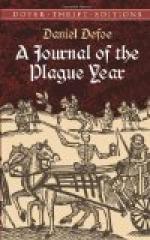In our parish of Aldgate the dead carts were several times, as I have heard, found standing at the churchyard gate full of dead bodies, but neither bellman, or driver, or any one else, with it. Neither in these or many other cases did they know what bodies they had in their cart, for sometimes they were let down with ropes out of balconies and out of windows, and sometimes the bearers brought them to the cart, sometimes other people; nor, as the men themselves said, did they trouble themselves to keep any account of the numbers.
The vigilance of the magistrate was now put to the utmost trial, and, it must be confessed, can never be enough acknowledged on this occasion; also, whatever expense or trouble they were at, two things were never neglected in the city or suburbs either:—
1. Provisions were always to be had in full plenty, and the price not much raised neither, hardly worth speaking.
2. No dead bodies lay unburied or uncovered; and if any one walked from one end of the city to another, no funeral, or sign of it, was to be seen in the daytime, except a little, as I have said, in the first three weeks in September.
This last article, perhaps, will hardly be believed when some accounts which others have published since that shall be seen, wherein they say that the dead lay unburied, which I am sure was utterly false; at least, if it had been anywhere so, it must have been in houses where the living were gone from the dead, having found means, as I have observed, to escape, and where no notice was given to the officers. All which amounts to nothing at all in the case in hand; for this I am positive in, having myself been employed a little in the direction of that part of the parish in which I lived, and where as great a desolation was made, in proportion to the number of the inhabitants, as was anywhere. I say, I am sure that there were no dead bodies remained unburied; that is to say, none that the proper officers knew of, none for want of people to carry them off, and buriers to put them into the ground and cover them. And this is sufficient to the argument; for what might lie in houses and holes, as in Moses and Aaron Alley, is nothing, for it is most certain they were buried as soon as they were found. As to the first article, namely, of provisions, the scarcity or dearness, though I have mentioned it before, and shall speak of it again, yet I must observe here.
1. The price of bread in particular was not much raised; for in the beginning of the year, viz., in the first week in March, the penny wheaten loaf was ten ounces and a half, and in the height of the contagion it was to be had at nine ounces and a half, and never dearer, no, not all that season; and about the beginning of November it was sold at ten ounces and a half again, the like of which, I believe, was never heard of, in any city under so dreadful a visitation, before.
2. Neither was there, which I wondered much at, any want of bakers or ovens kept open to supply the people with bread; but this was indeed alleged by some families, viz., that their maidservants, going to the bakehouses with their dough to be baked, which was then the custom, sometimes came home with the sickness, that is to say, the plague, upon them.




